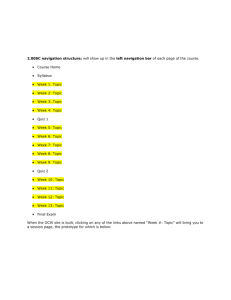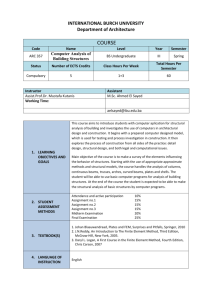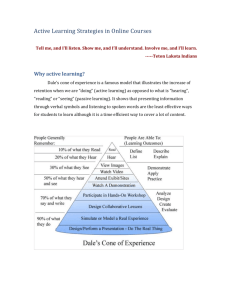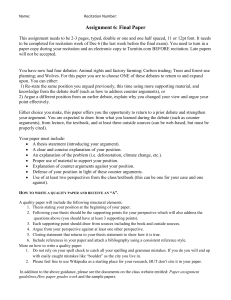Requirements and Syllabus: UGC 111 (C)
advertisement
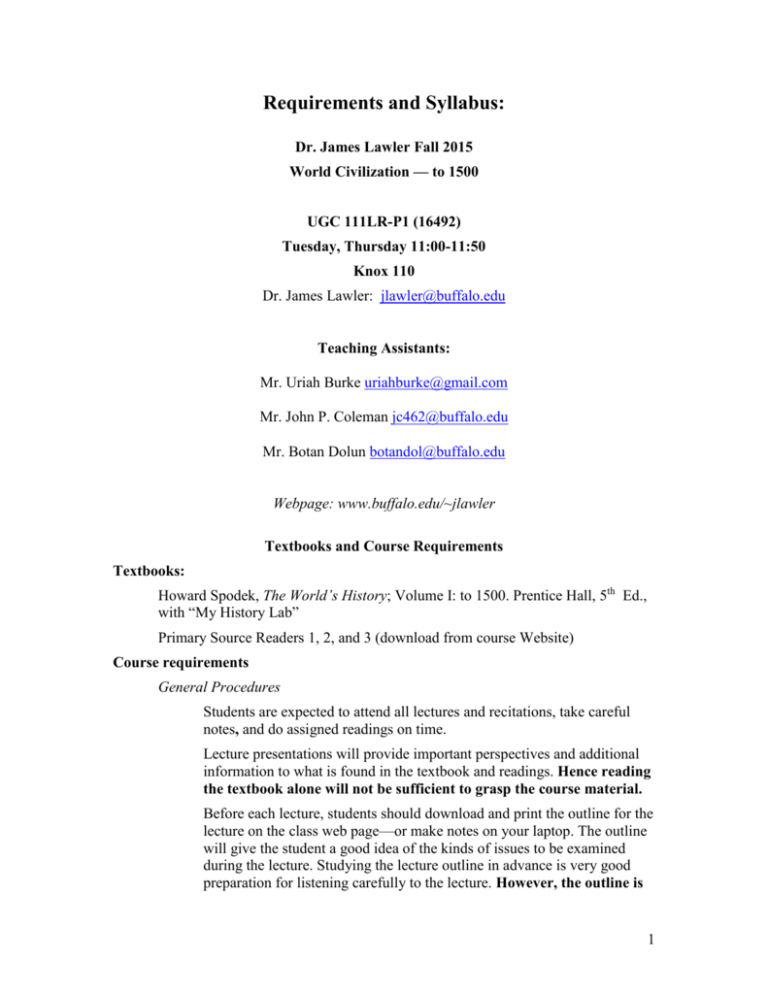
Requirements and Syllabus: Dr. James Lawler Fall 2015 World Civilization — to 1500 UGC 111LR-P1 (16492) Tuesday, Thursday 11:00-11:50 Knox 110 Dr. James Lawler: jlawler@buffalo.edu Teaching Assistants: Mr. Uriah Burke uriahburke@gmail.com Mr. John P. Coleman jc462@buffalo.edu Mr. Botan Dolun botandol@buffalo.edu Webpage: www.buffalo.edu/~jlawler Textbooks and Course Requirements Textbooks: Howard Spodek, The World’s History; Volume I: to 1500. Prentice Hall, 5th Ed., with “My History Lab” Primary Source Readers 1, 2, and 3 (download from course Website) Course requirements General Procedures Students are expected to attend all lectures and recitations, take careful notes, and do assigned readings on time. Lecture presentations will provide important perspectives and additional information to what is found in the textbook and readings. Hence reading the textbook alone will not be sufficient to grasp the course material. Before each lecture, students should download and print the outline for the lecture on the class web page—or make notes on your laptop. The outline will give the student a good idea of the kinds of issues to be examined during the lecture. Studying the lecture outline in advance is very good preparation for listening carefully to the lecture. However, the outline is 1 only an outline, and does not contain sufficient information for adequately understanding the lecture. Therefore, it is essential to take notes. To make efficient notes, the student should select a printing format that is optimum for note-taking, such as three slides per page. Lecture attendance: 10% of grade Attendance will be taken periodically during lectures. After two absences, each additional absence will result in a reduction of 2 points from the participation total. There will be a possible loss of ten points, which will result in a reduction of one whole grade. In order to participate actively during the recitation section, students need to have attended lectures. During lectures, students should sit with their recitation groups and regular study partners. The seating assignments will be given early in the semester. Quizzes: 30% of grade At each recitation session there will be a short quiz, based on assigned readings and lectures. The lowest two quizzes will be dropped. Students will be excused from a quiz only with a doctor's letter for illness or a comparable reason for missing class with evidence. Other reasons for missing quizzes ("My car had a flat") will not be accepted, since the expectation of such accidents is part of the reason for dropping the two lowest quizzes. Written work: 30% of grade Journal: 15% of grade Students must keep a regular journal for developing his or her personal reflections on the Primary Source Readings (Book of Genesis, Epic of Gilgamesh, etc.) Don’t just summarize materials. Make it clear that you have carefully read the readings themselves by referring to interesting parts of the text. 1) Try to find some interesting points in these readings that were not mentioned in the lecture. This shows you have read the material. 2) Explain why you found these points interesting. 3) Explain how these points add to what you have read in Spodek and heard in lecture regarding the historical context of the primary source readings. Students will be expected to make two entries a week. Entries should be at least one full page (using 12 point font, double space and one inch margins). If journals are handwritten, the length should be equivalent to a printed version. Be sure that the entries are mainly on the assigned Primary Source Readings to be covered during the recitation section. 2 Journal entries will be shared with classmates during recitation sections. Students must bring journals to recitation. Journals will be handed in periodically to the instructor. Failure to have the appropriate journal material available for discussion in recitation class will result in a deduction of 2 points from the total grade for this journal requirement, to a maximum of 10 points (out of a possible 15). Research Essay: 15% of grade A research essay is required. It should be five to six pages, double spaced, 12 cpi (1500-1800 words.) Paper topics will be based on the topics in the Primary Source Readings. The paper must be based on one scholarly research article, which must be shown for approval to the recitation instructor two weeks prior to the presentation of the paper in class. See librarians in the Undergraduate Library for information on how to find scholarly articles. Encyclopedia articles like Wikipedia and similar articles from the Internet are not acceptable as your main source. Topics for papers based on Primary Source Readings: 1) Sophocles’ Antigone; 2) Plato; 3) Epictetus; 4) Confucius, 5) Lao-Tzu (Daoism); 6) Hinduism (Bhagavad-Gita), 7) Buddhism; 8) Book of Job; 9) Gospel of John; 10) The Koran; 11) Rumi (Sufi-Muslim poet) Students should be prepared to give a brief summary (5 to 10 minutes) of their paper during the recitation period at the appropriate time when the topic is being discussed in the lectures. The summary should be on interesting ideas that will stimulate class discussion. The student should be especially responsible for knowing the Primary Source Reading to which his/her paper is related. A full first draft of the paper must be completed at that time and shown to the instructor. The student should then incorporate comments and any new material presented in recitation or lectures for the final draft, which is due at recitation period the following week. There should be clear references for all sources (footnotes and bibliography). Plagiarism (which is easy to detect through Internet search) will result in 0 for this part of the course. (The same applies to journal entries.) Papers will be graded on the following points: 1. Does the paper clearly describe a relevant research paper that discusses the topic? 20%. 2. Does the paper illuminate the primary source texts? The student should show clearly that s/he has read the primary text or portion thereof. When in doubt, student should consult the instructor on what is required here. 20%. 3 3. Does the paper successfully incorporate relevant concepts presented in Dr. Lawler’s lectures and the Spodek text, showing the importance of the historical context? 20% 4. The student should point out differences in the points of view presented in the research article from what was presented in class and in the textbook. Which point of view is more accurate for understanding the primary source material, and why? 20%. 5. Does the paper show clarity and originality in its organization and treatment? 10% 6. Does the student provide insightful personal reflections based on the above considerations? 10%. Final exam: 30% of grade. The final exam will be comprehensive. 75% of exam will be multiple choice. 25% will be essay style. The outline for the Final Essay Question is posted on the course website. Use this outline as a guide for each part of the course to summarize the main points. The essay question for the final exam tests your understanding of the main expectation for this class, which is that you have a general understanding of the major civilizations discussed in this course. Do not schedule travel until you know the date of the final. That date cannot be changed. The final exam is scheduled for Tuesday, December 15, 2015, 11-45 – 2:45 in Knox 110 Recitation sections At recitation sections, students will discuss and analyze lectures, text readings, and written work (especially journals) in an active manner. The success of group discussions during recitation sections depends on students having taken careful notes during lectures, and having done readings and written work. Lack of preparation for recitation sections will also be a basis for losing participation points. This includes not having journal entries written and available for discussion (see above for this). At recitation sections, students must have with them the following: 1) Lecture outline containing the student’s own added notes 2) Up-to-date journal entries relevant for each recitation—relating to the lectures and readings to be discussed during the recitation section. 4 Class Participation: 10% out of 15% of Journal Grade for recitation sections and 10% for attendance in main lectures: for a possible loss of 20% of grade. The grades include attendance at lectures (10%) and participation in recitation sections, with special emphasis on having journal entries available for discussion (unprepared students can lose up to 10% out of the possible Journal total of 15%). The course is divided into large lectures and smaller recitation sections so that students will be able to participate actively and express their understanding of the lectures and readings. Failure to attend lectures and prepare for recitations spoils the function of the recitation section. If a student is unprepared, he or she cannot engage in discussions with other students. This is why stress must be placed on participation in this course. Website: Important materials, including lecture outlines and Primary Source Readings, are available on the class Web page at: http://www.buffalo.edu/~jlawler/courses/ugc111/ Special announcement: Please be advised that this course is a controlled enrollment course, which means that enrollment in it is restricted to first-time registrants only. Self-registration in this course in any subsequent Fall or Spring semester will be available only to those students who are taking the course for the first time. If you seek to repeat this course you should plan to register for it in a UB summer session. Repeat enrollment may be difficult or impossible in a Fall or Spring semester. Repeat enrollment is defined as enrollment by a student who previously enrolled in the course at UB or transferred an equivalent course to UB and for which course the student has a grade of 'A', 'B', 'C', 'D', 'F' or qualified value thereof [e.g., 'A-', 'D+'] or a grade of 'P', 'S', 'U', 'I', 'J'. 'N', or 'R'. A student may self-register to repeat a CEC only if the grade of record for the previous enrollment is 'W', i.e., administrative withdrawal. If you have any questions on this, please see an advisor in the College of Arts and Sciences Student Advisement and Services Center in 275 Park Hall. The university’s web page detailing what teachers are to tell students regarding the requirements of their course is at http://ugccourses.buffalo.edu/ Dr. Lawler’s Office Hours: 12-1 on Tuesday and 1-2 on Thursday in 131 Park Hall, by appointment, and by email at jlawler@buffalo.edu Use e-mail freely to ask questions and discuss problems with Dr. Lawler or with your recitation instructor, using their personal email addresses. 5


